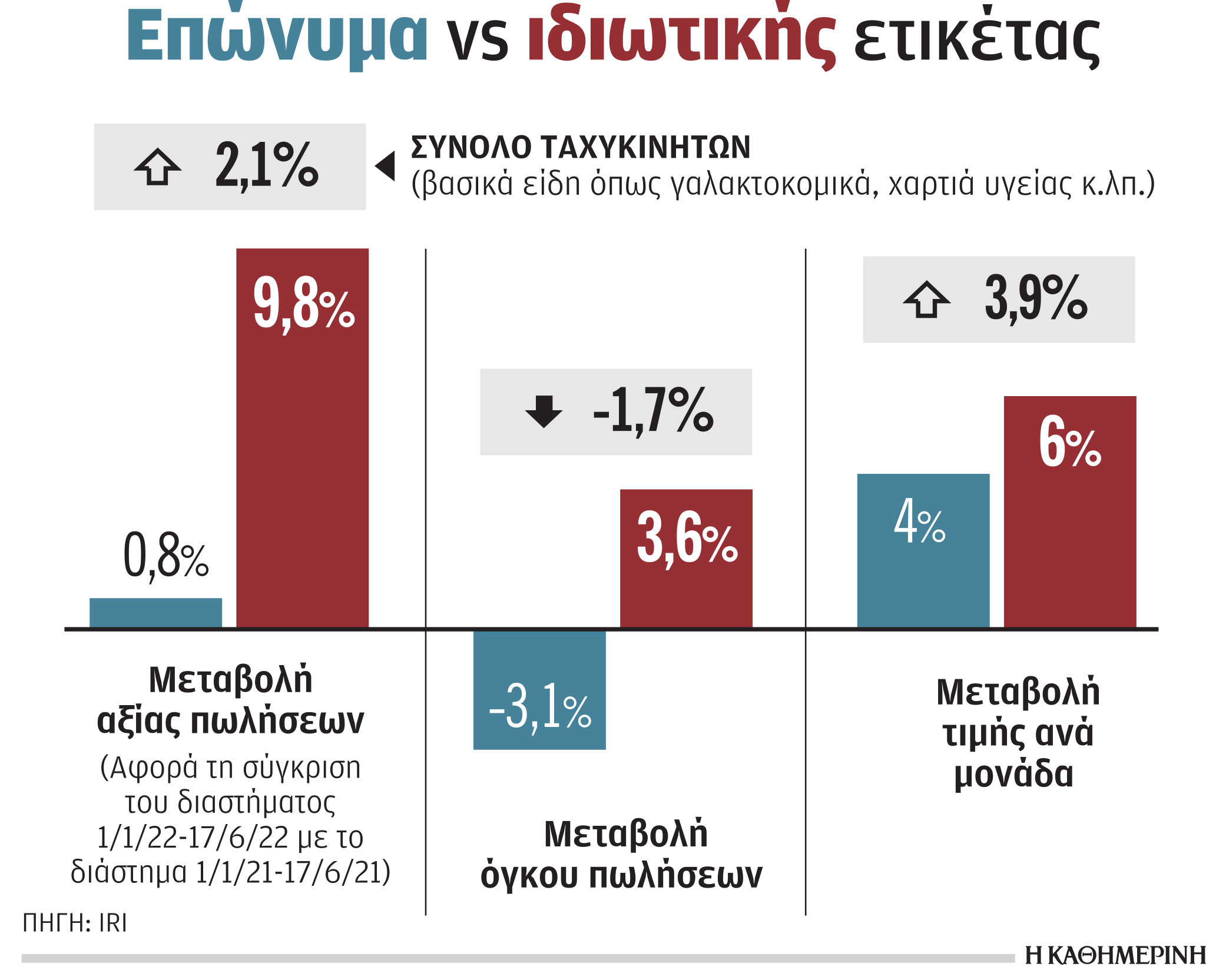
Beloved brands are being abandoned by more and more consumers in Greece, choosing their own brand products in the supermarket, in an attempt to limit the losses from the sharp – in intensity and duration – price increases for basic goods and services. Result; The share of private label goods, known to us as private label, begins and knows the glory days of a memorable category when it captured the largest piece of the supermarket pie in its history. turnover . In fact, they sell nearly five times the total sales of staple foods in supermarkets, despite their price rising at a faster rate than branded products as well.
According to research firm IRI, the share of PL in value terms in the first half of 2022 is 16%, compared to 14.8% in 2021. This is a share at the level of 2011, in the early years of the great economic crisis that hit Greece, when PL has become an alternative solution for many households whose disposable consumption income has been declining. The share of PL grew until 2014, then reached 19%, after which it began to gradually decrease until 2021. It is also worth noting that in very large supermarket chains, which have significantly increased their brands and product categories under their own trademarks, SMs today account for even 20% of their total turnover.

PL sales grew by 8.6% in the first half of 2022, while total supermarket sales in value terms increased by 1.1%, driven entirely by higher prices. This is due to the fact that sales volume decreased in the first half of 2022 by 2.2% compared to the corresponding half of 2021, while the unit price increased by 3.4%.
The gap in growth rates between branded and merchandise is even greater when it comes to so-called fast-moving goods (these are the most frequently consumed staples in supermarkets). Year-to-date sales of their fleet PLs through June 17 are up 9.8% compared to 0.8% for their brands. During the same period, sales of high-speed transmission lines increased by 3.6%, while sales of brands decreased by 3.1%.
Their sales grew by 8.6% in the first half of 2022.
From the foregoing, it becomes clear that a significant increase in prices has also occurred for products under their own brand. The basic “basket” of the supermarket, based on the prices of 60 main product categories, this year has a total value of 192.19 euros in the case of branded goods from 180.08 euros last year, i.e. it increased by 6.72%. The same “basket”, but with private label products, costs 133.32 euros this year compared to 123.68 euros last year, i.е. more expensive by about 7.8%. “Factors leading to higher prices affect brands and product positions (raw materials, packaging materials, logistics, etc.) equally. In private labels, because of the lower margin, it is “harder” to absorb some markups, as we see to some extent in branded (either by suppliers or retailers). Also, in branded products, despite successive months of inflationary pressure, we can call it “dangerous” to pass on all the cost increases to the shelf price. This is because not only consumption is at stake, but there is always the possibility that a product (or category) will remain off the list, off the basket,” notes Mr. Vangelis Foskolos, Senior Insights Consultant. , performing with “Kathimerini” on Sunday at IRI. Of course, he adds, “although we are seeing a larger percentage increase in PL, they are applied on a smaller basis (at a lower cost). Therefore, despite the increase, PL prices remain competitive, offering cheaper options in every product category.”
The growing shift to PL is also due to the fact that suppliers and retailers, in an effort to limit losses caused by rising production and operating costs, have significantly reduced offers. Promotions account for 24.9% of sales made in the first half of 2022, compared to 26.1% in the corresponding period of 2021. In fact, in household products (detergents, cleaners, etc.), products that have offers, the decline in offers is larger, by 23.3% this year from 26.6% last year.
Is there any chance that PL will become the first choice for consumers? “We can see that some of the consumers who were “attracted” by private labels at the current stage because of the price will remain in this option in the future,” Mr. Foskolos estimates. In the previous crisis, this did not happen, and PL shares were declining from 2015 to last year. It remains to be seen what will happen now.
Source: Kathimerini
Lori Barajas is an accomplished journalist, known for her insightful and thought-provoking writing on economy. She currently works as a writer at 247 news reel. With a passion for understanding the economy, Lori’s writing delves deep into the financial issues that matter most, providing readers with a unique perspective on current events.